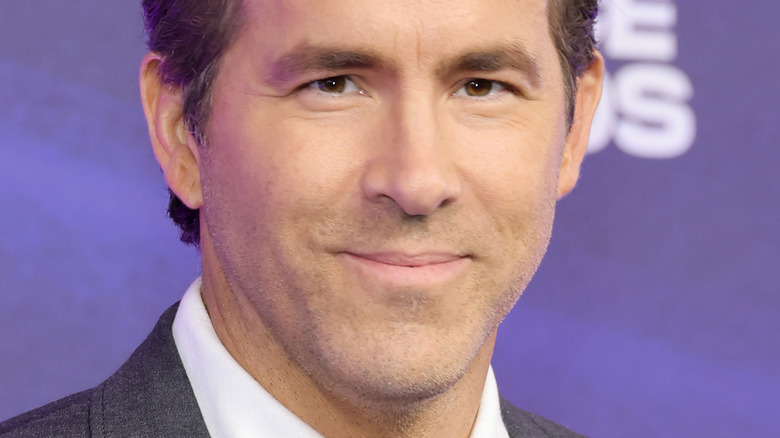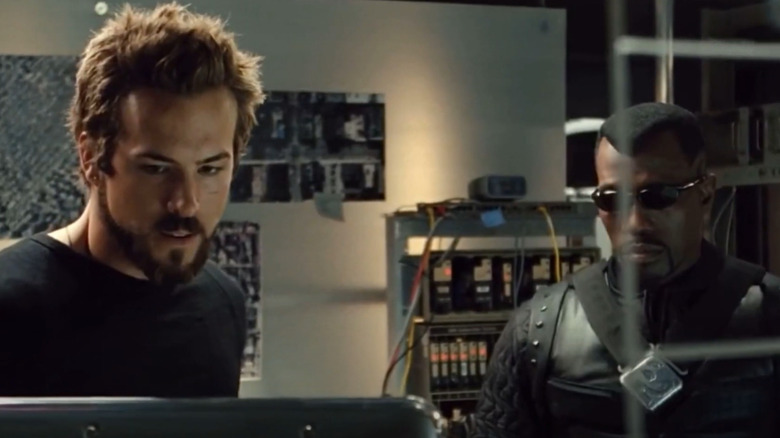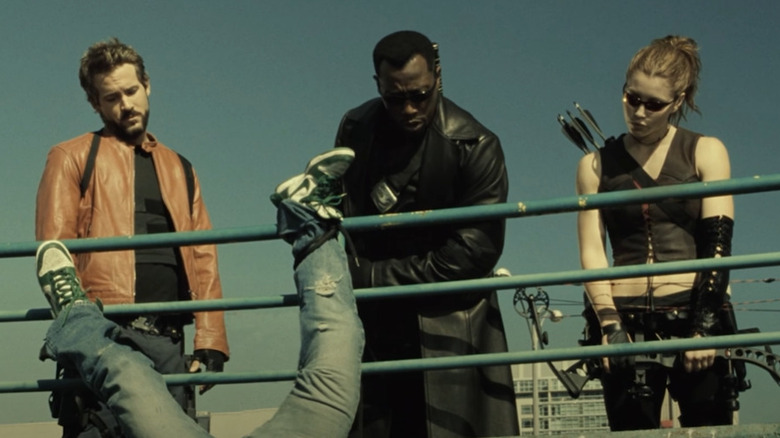The On-Set Feud That Happened Between Ryan Reynolds And Wesley Snipes
Before he reached his full potential as an action star in "Deadpool," Ryan Reynolds had to run a gauntlet of less-than-stellar comic book films. There was his first disastrous turn as Wade Wilson in "X-Men Origins: Wolverine," which Reynolds and "Deadpool" fans alike would prefer to forget, followed by "Green Lantern." But the role that helped him prove himself worthy of becoming the new-and-improved version of the Merc with a Mouth was that of Hannibal King in the 2004 film "Blade: Trinity."
Reynolds' role called for him to team up with Wesley Snipes' titular character to hunt vampires. King was part of a crew called the Nightstalkers, whose other members were played by Jessica Biel and Patton Oswalt. All three actors had unflattering things to say about Snipes' behavior while they were filming, with Biel telling Blackfilm that trying to make small talk with him was an exercise in futility. "I get a little response. Does he hate me? Is he pissed at me?" she said. "So I think it was a little unnerving for me." As for Oswalt, he told AV Club that Snipes physically attacked director David Goyer and later refused to speak to him, using Post-It notes instead.
But for a wisecracker like Reynolds, one of the most difficult aspects of working with Snipes was trying — and failing miserably — to get him to crack a smile.
Ryan Reynolds feels like he never actually met Wesley Snipes
In a 2004 interview with IGN, Ryan Reynolds theorized that the main reason Wesley Snipes' behavior made his "Blade: Trinity" castmates so uncomfortable is that he went full method as the humorless vampire hunter lead. Said Reynolds, "I never met Wesley, I only met Blade, and he is a method actor." While Snipes' coldness may have made him intimidating, it didn't deter Reynolds from trying to make him laugh. Pranking was a common practice on the set of the film, but Reynolds decided to solely rely on the most proven tool at his disposal: his tongue. "I don't think leaving fake vomit in his trailer was something I was willing to risk my life doing just yet," Reynolds quipped to The Sydney Morning Herald.
Sometimes, when Reynolds was joking about Snipes' surly demeanor, it would even make it into the film. "I do a dime store psychoanalysis of him where I say, 'You ever thought about sitting down and talking with someone, getting in touch with your inner child, and also you might want to try blinking once in a while,'" Reynolds recalled to IGN. "He just looks at me like he's gonna turn me into a** pulp." Patton Oswalt told AV Club that Reynolds also had to do a lot of ad-libbing simply because Snipes was absent from the set so often. So in a way, Snipes helped Reynolds turn Hannibal King into an early Deadpool prototype.
What Wesley Snipes said about his experience filming Blade: Trinity
According to writer Chris Parry (via eFilmCritic.com), what others involved in the production of "Blade: Trinity" had to say about Wesley Snipes' behavior was far worse than his co-stars' comments about what they believed to be method acting. "He refers to Ryan Reynolds as 'that cracker' ... 'tell that cracker to get out of my eyeline,' and 'tell that cracker to get his lines right,'" one crew member alleged.
In an interview with The Guardian, Snipes denied Patton Oswalt's claim that he attacked the film's director. "Let me tell you one thing. If I had tried to strangle David Goyer, you probably wouldn't be talking to me now," he said. Snipes also addressed his co-stars' comments about his supposed insistence on remaining in character, and they were possibly a bit unnerved if they read what he told Vice: that he actually wasn't method acting at all. He did, however, also insist that felt no animosity toward anyone involved in the film.
A lawsuit Snipes filed against the movie's producer, director, and production company possibly shed some light on why he came off as being frigid toward his co-stars. Per Variety, he complained about having no input in who was cast alongside him in the film, saying that he had advocated for a more diverse cast. He was also unhappy about the film's humorous slant — and Reynolds was responsible for providing many of its wittier moments.



